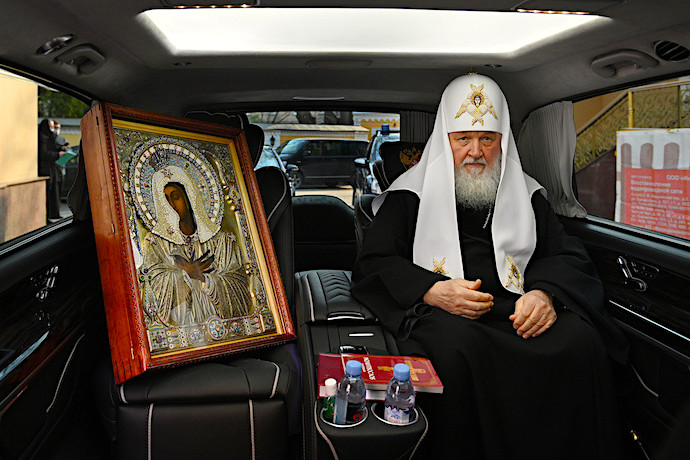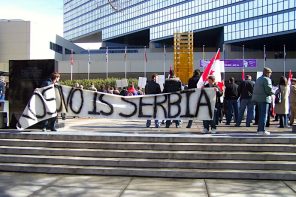The Russian Orthodox Church of St. Nicholas in Amsterdam has a rather prominent place in the Orthodox Christian pacifist movement, insofar as such a movement exists. St. Nicholas was, after all, the home parish of Jim Forest, an American writer and peace activist who converted to Orthodoxy. Forest first came to public attention as one of the “Milwaukee Fourteen,” a group of peace activists who burned selective service records to protest the Vietnam War. After his conversion, Forest would go on to help found the Orthodox Peace Fellowship, serving as its international secretary and the editor of its magazine In Communion. He was, in essence, the voice of the Orthodox Christian pacifist movement.
Jim Forest died earlier this year, but it would appear his legacy, including his willingness to run afoul of the authorities, continues at St. Nicholas. Immediately following the Russian invasion of Ukraine, the clergy of St. Nicholas, which was at this point, and for a long time before, a church under the Moscow Patriarchate, signed a petition asking Patriarch Kirill to call for an end to the violence.
So on March 4th, St. Nicholas’ clergy sent a letter to Archbishop Elisey—essentially their middle manager—telling him that Patriarch Kirill would no longer be commemorated at St. Nicholas as a result of his failure to condemn the invasion. This means that during worship services they would no longer acknowledge him as their chief bishop or pray for him.
Two days later, on a Sunday, Archbishop Elisey arrived unannounced at St. Nicholas (in a diplomatic car, according to church witnesses). He said his aim was to ensure that Patriarch Kirill would continue to be commemorated at St. Nicholas. Then, after the service, he told the clergy that their dispute with Kirill was of great concern to the Russian Ministry of Foreign Affairs. The clergy of St. Nicholas refused to relent.
It was at this point the threats began. A service was interrupted by a man who broke a window; an online smear campaign was launched against the parish; and the church was vandalized with the pro-Putin, pro-war “Z” symbol graffitied across the walls. Despite all this, the Archbishop inexplicably shared on social media that the situation at St. Nicholas had been resolved.
Thus, this past Saturday, March 12th, after an emergency parish council meeting, St. Nicholas announced that they had asked to leave the Moscow Patriarchate and join the Ecumenical Patriarchate of Constantinople, which seems willing to accept them. The Patriarchate of Constantinople may be abandoning attempts to appease Moscow by offering up Russian-tradition parishes in Western Europe. This proposal will be placed before the entire St. Nicholas community at a special General Parish meeting on March 26th. Until then, in the middle of Lent, St. Nicholas will not hold services due to safety concerns.
This very troubling situation should raise alarm bells far beyond Amsterdam. While church and state still remain officially separated in Russia, there’s little doubt that, particularly over the past decade, the Russian Orthodox Church has increasingly become allied with the Russian state which has, in turn, deployed it as an instrument of Russian soft power around the world. Particularly under the circumstances, we would be remiss to forget that one of the reasons the Ukrainian government petitioned the Ecumenical Patriarch with such diligence for an independent Ukrainian church is because of suspicions that Moscow Patriarchate churches were being used by the Russian state for espionage.
Furthermore, US Special Prosecutors, in their investigation of Russian state-sponsored hacking, found that senior non-Russian Orthodox clergy—most notably the Patriarch of Constantinople—had been targets. There were also concerns that the vast new Holy Trinity Cathedral, opened in Paris in 2016, would be used to spy on diplomats living nearby. This is all to say nothing of the fact that the Moscow Patriarchate’s recent power grab in Africa, ostensibly motivated by the ecclesiastical crisis in Ukraine, has been suggested by some commentators to be a front for the FSB (essentially a post-soviet version of the KGB).
The most recent letter to the faithful published with the consent of the highest ranking Moscow cleric in America makes it clear that they’re well aware of concerns about espionage, though it’s unclear whether they’ll do anything to address those, or whether they’ll simply double down. Abbot Nikodim writes, in part:
“Our fathers disregarded all the hardships of their time and were not afraid to remain faithful to the First Hierarch of Moscow, but today we are beginning to be ashamed of our position?”
It seems clear that the Moscow-based bishops in America will not break with Kirill and by extension Putin. Certainly that fact alone doesn’t make them spies or otherwise agents of the Russian state, but it does reveal an unwillingness to acknowledge that there are serious problems here. The Russian Orthodox Church isn’t neutral in this war and that requires everyone thus associated, especially in an official capacity, to start making their own position clear.
Our concern, most assuredly, should not be with all Russian Orthodox clergy or certainly with all faithful. Many, both inside and outside of Russia, have bravely spoken up against this war and the silence of their chief shepherd. But the events in Amsterdam cannot be ignored. Around the world, the Moscow Patriarchate frequently serves the interests of the Russian state. In light of recent events, there is no reason to believe that this will end and every reason to believe that it will become worse.
Additionally, the events in Amsterdam highlight the ways that the ongoing conflict between the Patriarchate of Moscow and the Patriarchate of Constantinople is deeply intertwined with geopolitics and now the global Culture Wars. As much as this is a conflict between Russia and the West, it’s also a conflict within Orthodoxy, in which not only the Russian Church but also the Russian state has a stake in keeping people and parishes on its side. As a consequence, it’s a conflict that can no longer be ignored by those outside the Orthodox world. After all, you never know when a Russian archbishop might show up in a diplomatic car in a neighborhood near you.





